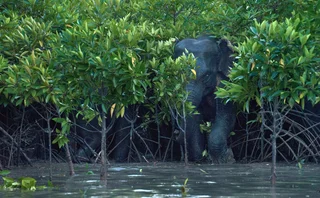Innovation of the year – Project: Tramontana
Energy Risk Awards 2025: Finance specialist develops transformational agroforestry project

For some 5,000 smallholder farmers across southern India, the voluntary carbon markets are proving to be transformational. They are participating in a novel agroforestry carbon-reduction project, developed by UK-based finance house Tramontana, winner of Energy Risk’s award for Innovation of the year – Project.
“In these marginalised communities, people are typically earning around $1 a day from subsistence farming and daily wage labour,” says Ram Loganathan, Tramontana’s head of carbon projects. “The initiative has turned these smallholders into coffee farmers, in the process multiplying their income by at least five times.” This has enabled life-transforming changes such as being able to send their children to secondary school, he adds.
These farmers, spread across Andhra Pradesh state in southern India, are living in ideal conditions for cultivating high-quality, shade-grown coffee. However, they have lacked the skills and resources to produce the cash crop. This is where Tramontana has come in, providing them with free coffee plants and silver oak saplings, and the training needed to cultivate the plants successfully.
“Key to the project is the intertwining of the crop income from the coffee bushes and the carbon sequestered by the shade trees,” Loganathan says. In other agroforestry carbon projects, the trees may be planted on a separate adjoining piece of land or on field boundaries. In the Tramontana project, the coffee bushes require shade to thrive. “This incentivises the farmer to look after the shade trees,” helping to ensure they successfully sequester carbon, he says.
The farmers are also using the trees to grow black pepper plants, a commercial creeper species that requires host trees to grow up. “This is providing farmers with an additional source of income,” Loganathan says.
Given historical controversies that have shaken the voluntary carbon markets – for example, around over-crediting and under-monitoring – project integrity is of utmost importance to Tramontana, Loganathan says. Its projects undergo certification by Verra, a leading greenhouse gas offset certification firm. Tramontana is currently moving the agroforestry project over to Verra’s latest methodology, VM0047, “to ensure that the carbon accounting is as robust as any seen in the market”.
The monitoring and measuring of the project’s carbon sequestration, and of its other social and environmental co-benefits, depends upon a combination of technology and shoe leather. Tramontana uses remote sensing and data from satellites, complemented by on-site measurements.
“On-the-ground monitoring is key both for quantifying the carbon accounting and for the wider success of the project, making sure that any concerns the farmers have are addressed and they are provided with continuous support,” Loganathan says. To that end, Tramontana has built up an India-based team of almost 100 staff to support this project and a clean cookstoves one.
“These are our own employees, and that allows us to have direct engagement with the local communities,” he adds.
Tramontana acts as project developer and investor, and markets the resulting offsets to corporate buyers. “We take an end-to-end approach,” says Loganathan, avoiding using middlemen or trading the credits in the secondary market, “because we want to maintain accountability”.
Loganathan declines to disclose the price the company markets the carbon credits for but says they attract premium prices. He also adds that more than half of the value of the credit goes directly to the farmers.
The premium nature of the offsets has helped insulate the project and Tramontana from some of the demand headwinds that have bedevilled environmental markets in recent years, and the specific controversies in the voluntary carbon markets, Loganathan says. “The market has been evolving, and those projects that have been using outdated methodologies and not following rigorous standards are being weeded out,” he says.
“The demand side is increasingly valuing those projects with a quality stamp” as a means to mitigate buyers’ reputational risk, he adds.
Tramontana’s shade-grown coffee project has now reached scale, says Loganathan. His team’s focus will now be on working with farmers to ensure the project is sequestering carbon at its full potential. It is also exploring helping farmers to obtain higher prices for their coffee beans by collectively marketing them.
The company is looking at replicating the project elsewhere: it has an office in Sri Lanka and is considering other jurisdictions. “We’ve now demonstrated the viability of the project type, and it’s something we think we can scale up elsewhere. On the [carbon] demand side, we see agroforestry as having a real future.”
More on Awards
Environmental products house of the year: ENGIE
Energy giant signs raft of forward-thinking environmental deals in Apac
Newcomer of the year: Marex
Commodities and financial services firm expands rapidly across Apac region, entering multiple new markets
Voluntary carbon markets house of the year: Marex
Marex’s support of mangrove projects provides high-quality credits for clients and socio-economic benefits for local communities
OTC trading platform of the year: Marex
Marex’s Agile platform registers impressive volume and client growth in Asia
Technology advisory firm of the year: KWA Analytics
With a focus on strategy and scalability, KWA Analytics improves clients’ operations in Japanese power, biofuels and certificates
Commodities technology house of the year: Topaz Technology
Strong revenue growth, Asia focus and a unique approach to unifying physical and financial risk
Electricity house of the year: Provincial Electricity Authority (PEA)
Power company uses renewables to help Thailand attract energy-intensive manufacturers amid recent geopolitical shifts
Energy Risk Asia Awards 2025: the winners
Winning firms showcase the value of prudent risk management amid challenging market conditions







